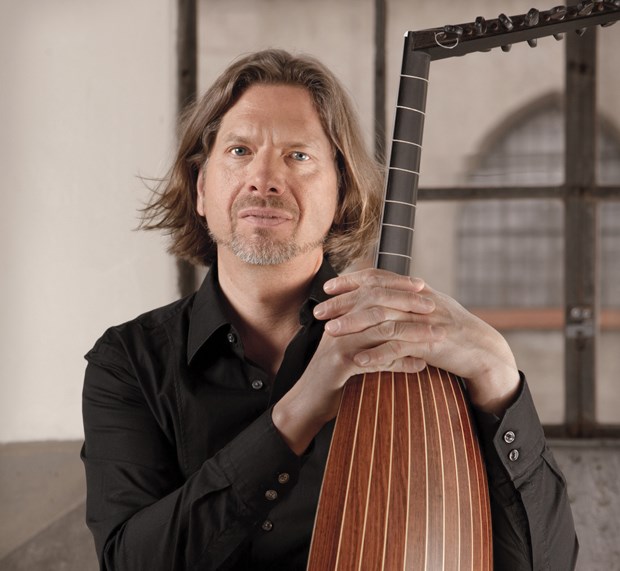Joel Frederiksen, Orpheus I Am at Presentation House Theatre, Feb. 4 at 8 p.m. Tickets $30/$27.
Orpheus is used to a tough room.
The mythical musician took a trip to the underworld and won his wife's freedom by charming a crowd only slightly less hostile than the beer-bottle launching, Patsy Clineloving gang on the other side of the chicken wire in Bob's Country Bunker.
To conjure Orpheus' journey for a modern audience, a singer needs to be able to sing a low D that dips into "the depths of hell."
That singer is Joel Frederiksen.
Frederiksen is preparing to take the stage at Presentation House Theatre for Orpheus, I Am, a celebration of 17th century music.
Born in Sleepy Eye, Minn., Frederiksen wields a basso profondo that was a gift from his contralto mother.
Once puberty finished breaking Frederiksen's voice and gluing it back together, the Minneapolis-raised performer found he had the lowest sound in his 70-singer high school choir.
Any singer should keep track of where their voice likes to live, Frederiksen explains.
"My voice has always liked to live pretty low," he says.
Now living in Munich, Germany, Frederiksen has retained his Minnesota accent, ending sentences with a friendly 'you know,' that wouldn't have sounded out of place in Fargo.
To counter the oceanic crust nature of his voice, Frederiksen accompanies himself on a lute tuned about one-third higher than a guitar.
It was an instrument he gravitated to after hearing a recital.
"The sound was just so magical," he recalls. "It sounds like glass to me, somehow. It has a clarity, a beauty to the sound."
Luckily for Frederiksen, the lute market in Maryland favoured the buyer, and he was able to pick up a cheap instrument.
Once he had the lute, a world of music dating back centuries opened up to Frederiksen.
Of particular interest was an English lutenist from the Tudor period named Robert Johnson, who composed work about Orpheus, as well as John Dowland, a lutenist who was known as the English Orpheus.
"They were writing in a different, more free, more declamatory fashion," he said.
Frederiksen is a student of music dedicated to the mythological Greek musician.
"Orpheus just seems to work. Everybody wrote pieces about Orpheus from (Christoph) Gluck to (Claudio) Monteverdi," he notes.
The notion of a singer who can turn rocks into streams is a metaphor for the Greek ideal of reaching the soul through music, he says.
Like F. Scott Fitzgerald famously wrote, Frederiksen beats on, boats against the current, ceaselessly into the music of the past.
"Early music was always something of an interest to me," he says. "I sang in madrigal choirs when I was in high school. I sang ever since I could remember."
Frederiksen admired singer/songwriters throughout high school, and took to penning his own tunes.
After studying voice in university, he interned at the Library of Congress, delving into stacks of vinyl and learning about the folk troubadours who crissed and crossed the country, singing about wine, women and work.
"I thought I might really be a folkie," Frederiksen explains.
The world of folk music was surprisingly closeminded, he recalls. It wasn't enough to sing a song, you had to have lived it.
"Obviously I couldn't go back and grow up again in the Appalachian Mountains," he says.
So he moved further back.
He heard lutenist Julian Bream accompany English tenor Peter Pears singing Elizabethan lute music from 1600.
It was love at first pluck.
"I was totally fascinated and I right away recognized: this is another level of singer/songwriting."
He was also fascinated by the idea of the Renaissance man - a polymath who can speak multiple languages, write poetry, sing, and play an instrument.
Bringing Johnson and Dowland's music to life means knowing its history.
"You have to be at least a little bit interested in going to the library and doing some research," he says. "We can read a lot about the performance circumstances, think about where they performed and there's a lot of people writing about music theory and also reflections on what things sounded like."
But Frederiksen's concerts are meant to be more than a re-enactment of music that used to move people. It's intended as a revival, reaching the audience on a visceral level.
"We don't have a CD of how John Dowland really sounded," Frederiksen says, laughing. "I perform for modern day audiences. I'm a person, you know. I live now. I'm interested also in communicating with my audience now."
For I Am Orpheus, Frederiksen hopes to give a performance good enough to free a spouse from the underworld.
"I don't give a lecture at my concerts," he says. "I'm interested in touching my audience, in moving people, in having that connection and that reaction that you can only have in live performance."



